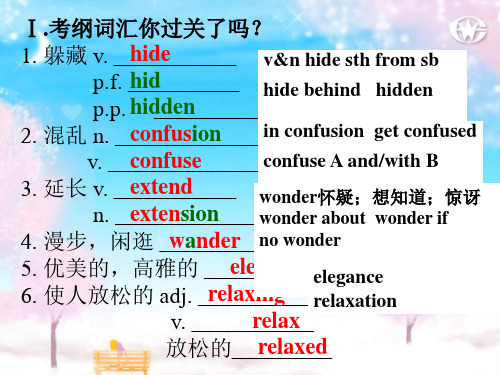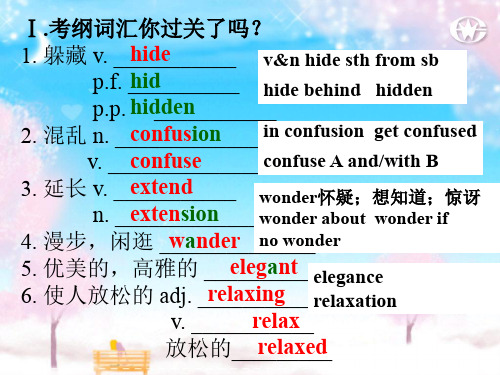外语教学与研究出版社高中英语必修5Module-4-语言点汇集
- 格式:doc
- 大小:33.50 KB
- 文档页数:5


Module4 Grammar and Vocabulary精品教案Teaching objectives:1. To learn new words and expressions and learn how to use them.2. To review of the passive voices.Difficult and important points:1. Get the students to know how to use passive voices:一般现在时和一般过去时的被动语态2. The usage of: hide, pretend, memory, wander, come to an end, dress up; consist of be good for ,date from.Teaching procedures:Step 1. RevisionRead the sentences and find out what grammar are they?1. Is the room cleaned every day?2. We were woken up by a loud noise during the night.3. Something must be done before it is too late.4. Have you heard the news? The President has been shot?5. The car was three years old but hadn’t been used very much.6. There’s somebody walking behind us. I thin k we are being followed.Step 2. Presentation—被动语态被动语态的基本形式是: be +过去分词根据时态的不同, be的形式有所变化. (1) 一般现在时的被动语态: am/is /are+过去分词(口语可用get/become或got /became)(2) 一般过去时的被动语态:was /were+过去分词被动语态的基本用法:不知道或没有必要提到动作的执行者是谁时用被动语态.强调或突出动作的承受者常用被动语态.(有时可省略).使用被动语态应注意的几个问题.(1) 主动变被动时双宾语的变化. 看下列例句eg: 我朋友在我生日时送我一本有趣的书.My friend gave me an interesting book on my birthday.— An interesting book was given to me (by my friend) on my birthday.—I was given an interesting book (by my friend) on my birthday.(2) 主动变被动时,宾补成主补(位置不变);作宾补的省略to的不定时在被动语态中应加to.eg: 老板让他整天工作.The boss made him work all day long.— He was made to work all day long (by the boss).(3) 短语动词变被动语态时,勿要掉”尾巴”.eg: 孩子们被他照顾的很好.—The children were taken good care of ( by her).eg: 要注意一下你的发音和拼写.—Your pronunciation and spelling should be paid attention to.(4) 情态动词和be going to, be to, be sure to ,used to, have to, had better等结构变被动语态,只需将它们后面的动词原形变为be +过去分词。

外研版高二英语必修五第四模块language points 导教案Module 4 CarnivalLearning aims:1.Understand the important points.2.Do some practice.Ⅰ. Important points1. Think of carnival, and you think of crowds, costumes, and confusion.think of :思虑,考虑It’s a good idea, but think of the cost!2.In Europe, where it began, carnival was followed by forty days without meat, as people prepared for the Christmas festival of Easter.follow: vt, 随着;理解;遵从You go first and I’ll follow later.I don’tquite follow you, would you explain it again?You should follow the instruction on the battle.3.Having fun means eating, drinking, and dressing up.Having fun 为动名词短语作主语,动名词作主语,表示抽象、泛指不详细的动作。
Mean:vt. 意欲;打算mean doing:意味着做mean to do sth:打当作某事我们中国人素来说话算数。
我其实不是说你应当走开。
We Chinese always mean what we say.I didn’tmean that you should go away.4.For weeks on end people walked round the streets wearing masks, doing what they wanted without being recognized.wearing masks, doing what——为此刻分词短语在句中作陪伴状语。



Module 4 CarnivalThe Magic of the MaskThink of carnival, and you think of crowds, costumes, and confusion想到狂欢节你就会想到群众、服装和混乱。
The sounds and sights change from one country to another but the excitement is the same everywhere随着国家的变化听到的和看到的都是不同的,但是任何地方人们都是兴奋的。
“Carnival” comes from two Latin words, meaning “no more meat”“狂欢节”是由俩个拉丁词演变而来的,它的意思是“不要吃肉”。
In Europe, where it began, carnival was followed by forty days without meat, as people prepared for the Christian festival of Easter欧洲是狂欢节的发源地,在接近狂欢节的四十天里是不能吃肉的,人们准备迎接基督教的“复活节’。
People saw Carnival as a last chance to have fun at the end of the winter season Having fun meant eating, drinking, and dressing up人们把狂欢节做为冬天结束前最后的一个玩乐机会,尽情的吃喝玩了、打扮。
The most famous carnival in Europe was in Venice欧洲最著名的狂欢节是在威尼斯。
At the beginning, it lasted for just one day People ate, drank, and wore masks刚开始的时候,狂欢节只持续了一天。
外研社第五册模块4 词语讲解1.hidev. 藏,隐瞒,遮避n. 兽皮I haven't seen hide nor hair of him.我连他的影子也没见到。
I hid the broken plate behind the table.我把打碎的盘子藏在餐桌后面了。
She tried to hide her feelings.她设法不表露自己的感情。
The child was hiding behind the sofa.那孩子藏在沙发後面了.His words had a hidden meaning.他话里有话.2.extendThe hot weather extended into October.炎热天气一直持续到十月。
My garden extends as far as the river.我的花园一直伸展到河边。
The road extends for miles and miles.这条路向远处绵延伸展.The bird extended its wings in flight.那鸟展翅飞翔.He extended his hand to (ie offered to shake hands with) the new employee.他主动与新雇员握手.3. pretendThe young actor pretended to be Hamlet.那个年轻演员扮演哈姆雷特。
She pretends that she likes them so that she can get their help.她假装很喜欢他们,借以获得他们的帮助。
Surely he doesn't pretend to any understanding of music!谅他不会自以为懂得什麽音乐吧!4.bookY ou'll have to book early if you want to see that fashion show你要想看那场时装表演的话,就得早点儿定座位。
Module 4 语言点汇集重点单词【词条1】extend【课文原句】As time passed, however,the carnival period was extended, so that it began just after Christmas.(Page 32)【点拨】extend在这里是及物动词,表示“使延长”。
这句话的意思是“渐渐地,庆祝狂欢节的时间长了,圣诞节一过狂欢节就开始了”。
再如:The ancient Romans extended their empire into Asia。
【拓展】⑴extend 还有下面几个意思:①延伸,延续, 继续( vi.).如:The main holiday period was once from May to August;now it extends into September。
②伸出(手臂等),展开(翅膀)(vt.)。
如:He refused to take the hand I extended in friendship。
③给予(欢迎、帮助等)。
如:We extended our warm welcome to Professor Liu。
⑵辨析extend和expand:①extend指呈直线的长度上的伸展,引申为扩大势力范围。
如:There are plans to extend the no—smoking area。
②expand指“膨胀;扩张”,表示事物从小向大增长,表示数量或面积上的扩大。
如:Metals expand when they are heated.⑶派生词:extension n。
扩大,延长;extensive adj.广泛的,广阔的;extent n。
长度,广度,大小【词条2】pretend【课文原句】Ordinary people could pretend to be rich and important…(Page32)【点拨】动词pretend表示“伪装;假装”。
Module 4 语言点汇集重点单词【词条1】extend【课文原句】As time passed, however, the carnival period was extended, so that it began just after Christmas.(Page 32)【点拨】extend在这里是及物动词,表示“使延长”。
这句话的意思是“渐渐地,庆祝狂欢节的时间长了,圣诞节一过狂欢节就开始了”。
再如:The ancient Romans extended their empire into Asia.【拓展】⑴extend 还有下面几个意思:①延伸, 延续, 继续( vi.)。
如:The main holiday period was once from May to August; now it extends into September.②伸出(手臂等),展开(翅膀) (vt.)。
如:He refused to take the hand I extended in friendship.③给予(欢迎、帮助等)。
如:We extended our warm welcome to Professor Liu.⑵辨析extend和expand:①extend指呈直线的长度上的伸展,引申为扩大势力范围。
如:There are plans to extend the no-smoking area.②expand指“膨胀;扩张”,表示事物从小向大增长,表示数量或面积上的扩大。
如:Metals expand when they are heated.⑶派生词:extension n.扩大,延长; extensive adj.广泛的,广阔的;extent n. 长度,广度,大小【词条2】pretend【课文原句】Ordinary people could pretend to be rich and important…(Page32)【点拨】动词pretend表示“伪装;假装”。
这句话的意思是“普通人可以装成阔佬和要人……”。
再如:He pretended to be reading an important paper when the boss entered.【拓展】①pretend 后面可跟动词不定式,从句或名词。
如:She pretended to be friendly with me by repairing my computer.Let’s pretend that we’re on an isolated island.He pretended a headache, so he wouldn’t have to go.②pretend to 表示“自称具有,自称应得到”,这里to为介词。
如:I can’t pretend to any great musical talent.He pretended to the throne of England.【词条3】revive【课文原句】But in the late 1970s the tradition was revived by students.(Page 33)【点拨】revive在文中表示“重新恢复(希望、风俗、兴趣等)。
这句话的意思是“但是在20世纪70年代后期,狂欢节这个传统又被学生们恢复了”。
再如:The old custom has recently been revived in some parts of the country.【拓展】⑴revive 还可以表示“苏醒;恢复生机等”意思。
如:The woman has fainted from the heat,but she soon revived.The rose will revive if you water it.⑵revive 中前缀re-表示“重新,再”的意思。
再如:reconsider 重新考虑;replay 重赛,重放等。
请注意本模块的其他三个单词:①excitement = excite + ment 兴奋动词-ment(名词性后缀)引出名词派生词。
如:amusement 娱乐, encouragement 鼓励, agreement同意。
②unpunished = un + punish + ed未受惩罚的un- 是否定前缀,与形容词、副词、名词结合表示“不,非”,如:unable 不能的,unfair 不公平的;与动词结合表示“相反,对立”,如:unlock 开锁,unloose解开。
③multicultural = multi + cultural 多元文化的multi- 是表示“多”的前缀。
如:multinational多国的,跨国的;multicolored多彩的。
重点短语【短语1】come to an end【课文原句】The original Venice carnival came to an end about 200 years ago.(Page 32) 【点拨】come to an end 表示“结束, 终止”, end在这里作名词。
这句话的意思是“最初的威尼斯的狂欢节在大约200年以前结束了”。
再如:When the party came to an end, people all leave the hall.【拓展】含有end 的习惯用法:①on end “(时间上)连续地;直立的”(见课本Page 32)。
如:The play ran for 460 nights on end,it was one of the successes of the season.At the approach of the snake,her hair stood on end.②be at an end “结束, 没有了”。
如:I must warn you that my patience is almost at an end.③be at the end of one’s rope “山穷水尽,智穷力竭”。
如:Forest was out of work and broke,and he was at the end of his rope.④make (both)ends meet “使收支相抵,使入能敷出”。
如:With high taxes and his small income John had great difficulty in making end s meet.⑤put an end to “结束(不好的事),制止”。
如:We must manage to put an end to the foolish behivour.【短语2】dress up【课文原句】Having fun meant eating, drinking, and dressing up. (Page 32)【点拨】dress up在句中的意思是“穿上盛装,乔装打扮”。
这句话的意思是“痛快地玩一场就意味着尽情地吃、喝、乔装打扮”。
如:They dressed up for their daughter’s wedding.【拓展】⑴dress 用作动词时的意思及常见用法为:穿衣,给某人穿上衣服。
它作及物动词时,后面不加表示衣服的名词,但可以用指人的名词或代词作宾语。
如:He was dressed in a dark suit at the meeting.She dressed her children every morning.⑵请看dress的一些特殊意思:dress a shop window 布置商店的橱窗dress a wound 敷裹伤口dress one’s hair 梳理头发dress a salad 拌色拉【短语3】consist of【课文原句】a food that consists of a tube of skin containing meat mixed with herbs (Page 35) 【点拨】consist of表示“由……组成”,它的同义短语为be made up of。
再如:The United Kingdom consists of Great Britain and Northern Ireland.【拓展】①consist(与in连用)表示“主要是,主要在于”。
如:The beauty of the plan consists in its simplicity.Education doesn’t consist simply in learning a lot of facts.②consist(与with连用)表示“一致,符合”。
如:Theory should consist with practice.【短语4】date back to【课文原句】Their use was limited by laws,the first of which dates back to the fourteenth century. (Page 33)【点拨】date back to表示“可追溯到;从……就有了;属于(某一历史时期)”。
这句话的意思是“(政府)制定了限用面具的法律条文,这最早可追溯到14世纪”。
再如:His interest in stamp collecting dates back to his school days.【拓展】go back to 和date from也可表示“追溯到”,与date back to 用法完全相同。
go back to如果表示一段时间,则不需要用介词to。
如:My family goes back 300 years,while his family goes back to the 16th century.Dating from the Tang Dynasty,many people lived a happy life.热点语法被动语态的用法小结被动语态表示句子的主语和谓语动词之间是被动关系,其句子的谓语动词是“be + 及物动词的过去分词”。
此外,被动语态的句子还有各种时态的变化,都体现在be 上。
例如:①The work was completed on a windy night.②This kind of chocolate has been made several times.③The road will be built next year.④The house was being cleaned when I came home.⑤These trees must be taken good care of.下面我们详细的来了解一下:★使用被动语态的场合1、不知道或不必指出动作的执行者时。